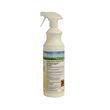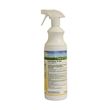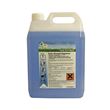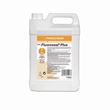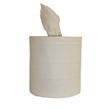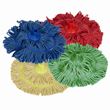Cleaning sanitisers to combat E-Coli
15 June 2011
Recent E-Coli outbreaks prompt us to apply bactericidal cleaning supplies
Establishments and consumers are becoming increasingly concerned with food hygiene and standards of cleanliness in relation to the food they are purchasing. With growing numbers of E-coli cases being detected in our food and Germany possibly tracing the outbreak back to a nursery growing green beans, food processors and handlers are busy reviewing their cleaning guidelines and their use of bactericidal cleaning supplies.

Salads should be washed using bactericidal salad wash.
E.coli or Escherichia coli is a bacteria that causes severe diarrhea and stomach cramping. Symptoms tend to be more severe in children and older people, or those with low immune systems or other illnesses.
Instances of infection tend to rise in the warmer months. Bacteria will flourish in warmer conditions highlighting the need for greater attention to cleaning and hygiene at these times.
In many cases cleaning is being carried but the correct cleaning supplies are not being selected to do the job properly. When identifying a cleaning product from a range of cleaning supplies it is important to have a clear idea of what the cleaning product is actually required to do.
If the cleaning task is simply to clean and degrease a surface then a regular degreaser from your cleaning supplies stock may be perfectly suitable for the job in hand. However when we move into the area of sanitising surfaces it is important to know that the cleaning product being used is a tested bactericidal cleaning product capable of killing a broad spectrum of bacteria.
We have an excellent range of bactericidal cleaning supplies effective against harmfull bacteria including E-coli. Choose from our ready to use cleaners or concentrated dilutable cleaning products all tested and approved by the independant British Analytical Board
E-coli is highly contagious and can easily be passed from person to person or from contaminated objects . Regular handwashing will help reduce the hand carriage of the bacteria. Bactericidal hand soaps together and alcohol hand sanitisers are esential items for a cleaning supplies budget particularly within the care sector.
High traffic areas within an establishment wether it be an office or a care home, should be properly assessed and areas once highlighted given a higher priority regarding their cleaning frequency with an appropriate bactericidal cleaning product.
Here are a few tips to follow to prevent E-coli outbreaks;
- Keep your hands clean with regular washing
- Carry an alcohol hand sanitiser with you
- Ensure surfaces are cleaned and sanitised regularly
- Handle bedding safely and wear appropriate protective clothing
- Adhere to kitchen cleaning schedules
- Ensure salad is washed with a bactericidal salad wash
- Vegetables should be washed and cooked properly
- Cook ground beef until you see no pink anywhere
- Don't taste small bites of raw ground beef while you're cooking
- Keep cooked meats away from raw meat
- Defrost meats in the refrigerator or the microwave. Don't let meat sit on the counter to defrost
- Keep raw meat and poultry separate from other foods. Use hot water and bactericidal detergents to wash cutting boards and dishes if raw meat and poultry have contacted with them
- Don't drink raw milk
- Keep food refrigerated or frozen
- Cover and allow leftover food to cool before refrigerating
- People with diarrhea should wash their hands carefully and often, using hot water and bactericidal soap, and washing for at least 30 seconds
- People with diarrhea need to thoroughly clean and disinfect the lavatory after use and ensure the rest of the bathroom is cleaned with a bactericidal cleaning product
For any further advice or information regarding cleaning supplies to combat E-coli and other bacteria please do not hesitate to contact us.



